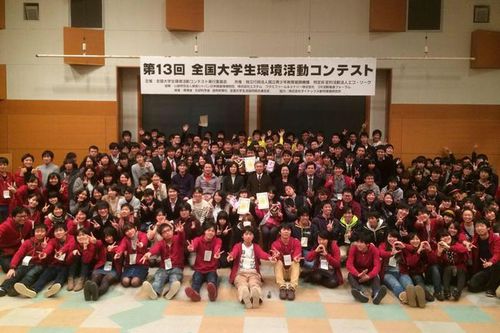April 7, 2016
Cooperation Helps People Reach Goals -- Lessons Learned from Ecocon
Keywords: Education

Copyright ecocon2015 All Rights Reserved.
The national college environmental activity contest, called Ecocon, has been held annually since 2003. High school students, as well as college and postgraduate students, who are involved in environmental activities participate in the contest and make presentations about their activities. The Ecocon event aims to improve each activity by exchanging ideas and opinions among students at workshops. This article introduces a view shared by Yuta Hashimoto, a student representative of the 13th Ecocon (ecocon2015), about how younger generations can develop themselves through their participation in Ecocon, based on his own experience.
Ecocon2015 was held on December 26 and 27, 2015. Among 44 entries, Kagoshima University's Sustainable Campus Project (SCP) won the grand prize with votes from selection members and was given the Environmental Minister's Award. The second prize and the audience award selected by votes from audiences went to Kyushu University Natural Environment Researching Society (Q-NERS).
We have different themes every year, and the theme for 2015 was "environmental cooperation." It is not a single person who is struggling and making efforts to solve environmental problems; various people tackle the issues with their own ideas. In our everyday activities, we do not always see how we are related to wider society, but we are all part of a group who act against environmental problems. With support and cooperation from group members, I believe we can achieve greater outcomes.
We have therefore organized many events throughout the year, including contests in line with the theme, and never had I felt such a drive in students. Collaborating with other environmental activist student groups has brought about different perspectives and new ideas, allowing us to achieve things that otherwise had been impossible, and infinite possibilities open up when you work together on environment issues.
Of course it was not all easy. There were number of occasions where communication stalled because everyone had his or her own group's responsibilities to fill, which made it difficult to get together often. Nonetheless, as odd as it seemed, nobody gave up. Everyone focused on the success of the events.
I never imagined that the mere enthusiasm to tackle environmental problems would bring people together. There is a saying: "If you want to go fast, go alone. If you want to go far, go together." It appears that every one of us understood that in our hearts, if not in our heads.
Ecocon 2015 drew much attention after the event, and the contest itself, as well as winning groups, have been featured in newspaper articles. This may not seem like such a big deal, but for any group that wants to have their activities known to society, it gives them a greater sense of responsibility and motivation.
The contest also gave me the chance to improve my group management skills, planning skills and in particular, communication skills, by working with other members as a representative. The process of discussing what to do, identifying fundamental issues and then reflecting them in actual planning is exactly what I will have to go through when finding the answer to how I should live my life going forward.
Even after Ecocon, always being aware of what is at stake helps me carry out tasks without losing sight of what is important. In other words, communication with others has directly enhanced my capabilities.
There will be another Ecocon, and many more students to be involved next year and beyond. This involvement will also require "Kankyo" or environmental cooperation, which will continue to be the axis around which Ecocon revolves for years to come. Cooperating with others while appreciating the differences, I believe, can overcome the enormous challenge of environmental problems.
Yuta Hashimoto
Student Representative
The 13th National Student Environmental Activity Contest (Ecocon)
Related JFS Articles
Related
"JFS Newsletter"
- 'What Are the Roles of Zoos Today?' - Interview with Director of the Popular Asahiyama Zoo
- 15-Year Integrated Forest Environment Education in Shimokawa, Hokkaido to Support Sustainable Forest Management
- Fifth Contest to Award Excellent Environmental and Social Practices by Junior High, High School Students
- Locally Produced Food in School Lunches----A Challenge by Nyuzen, Japan
- Supporting 'Good Companies' that Create Future Society


